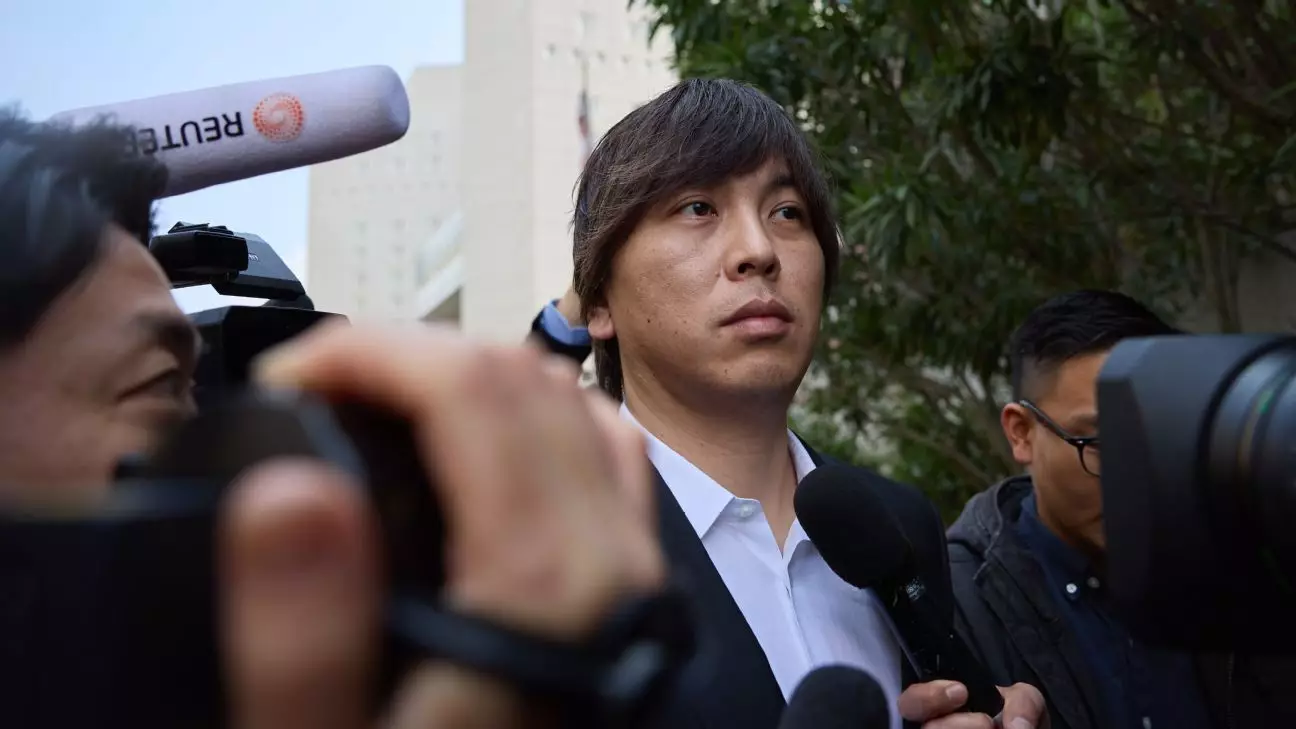The world of professional sports often brings forth instances of personal conflict intertwining with the immense pressure athletes face, and recent allegations involving Shohei Ohtani’s former interpreter, Ippei Mizuhara, exemplify this dynamic. Following his guilty plea for stealing substantial sums of money from the famed Los Angeles Angels star, questions arise not only about the details of Mizuhara’s alleged crimes but also about the underlying motivations and circumstances that led to such drastic actions.
Ippei Mizuhara stands accused of pilfering millions from Ohtani under the pretense of an escalating gambling problem. According to prosecutors, Mizuhara’s assertions of a gambling addiction were nothing more than desperate attempts to mitigate the consequences of his actions. The critical point in this case revolves around the prosecution’s strong rebuttal against Mizuhara’s claim that he was driven to thievery by overwhelming gambling debts. They have suggested that Mizuhara’s contentions lack substantial corroborative evidence.
This assertion is supported by an investigation that reportedly uncovered only minimal gambling activity by Mizuhara, predominately dating back to a solitary incident where he wagered a mere $200 at the Mirage casino in 2008. Such sparse activity raises questions about the validity of Mizuhara’s alleged gambling plight—an essential component of his defense strategy. Instead of a chronic issue, prosecutors argue that the evidence indicates Mizuhara had access to sufficient personal funds, highlighting a complete disregard for Ohtani’s trust.
Remorse is a complex emotion that often surfaces in legal settings, commonly leveraged by defendants aiming to appear sympathetic. Mizuhara’s request for a significantly reduced sentence—18 months rather than the nearly five years sought by prosecutors—was couched in expressions of regret for his actions. However, prosecutors challenge the authenticity of this remorse, pointing out that Mizuhara’s pleas appear more a reflection of self-preservation rather than genuine contrition for his betrayal of Ohtani.
The legal narrative emphasizes a broader question that courts frequently grapple with: Is remorse a genuine feeling or merely a strategy for leniency? This case significantly complicates the issue, as both sides present compelling arguments regarding Mizuhara’s intentions and mindset leading to his fraudulent actions. Prosecutors have laid emphasis on their belief that Mizuhara’s claims warrant skepticism, especially in light of his alleged financial stability prior to and during the fraudulent activity.
The Financial Landscape and Motivation Behind the Actions
To understand Mizuhara’s actions, it is essential to analyze the financial context. Prosecutors presented evidence indicating that, even while committing the thefts, Mizuhara had substantial financial resources at his disposal. At the time of the first fraudulent activity—reportedly a $40,000 transfer—Mizuhara allegedly possessed over $34,000 in his checking account. This revelation raises significant doubts about the authenticity of Mizuhara’s claims regarding his financial crisis due to gambling, suggesting that he chose to violate Ohtani’s trust instead of utilizing his available resources to address any supposed gambling debts.
Further scrutiny reveals that Mizuhara maintained a lavish lifestyle while duping Ohtani. Evidence submitted by prosecutors indicated that Mizuhara had no compelling expenses—no ongoing loans, minimal living costs, and even received a luxury vehicle from Ohtani. This juxtaposition of his lifestyle against the backdrop of his claims of financial hardship presents a narrative that critics cannot ignore. The reality that Mizuhara was able to manage substantial funds without leveraging those resources for repayment is alarming and paints a picture of entitlement overriding the ethical considerations one would expect from someone in his role.
This case extends beyond the individual actions of Mizuhara and highlights broader implications within the sports industry regarding trust, loyalty, and financial management. Athletes often build networks around themselves to navigate the immense financial and personal pressures of their careers. The betrayal faced by Ohtani not only marks a significant personal loss but also shines a spotlight on how predatory financial behaviors can infiltrate these trusted relationships.
Mizuhara’s case urges the sporting community to examine the policies and support systems surrounding athletes to foster better security in their financial dealings and personal interactions. For Ohtani, this episode may serve as a wake-up call to recalibrate how he, and others in similar positions, engage with their support staff to mitigate risks of manipulation or betrayal.
In leaning into the intricacies of this scandal, it becomes progressively clear that Mizuhara’s actions are emblematic of deeper systemic issues inherent in professional sports. While the legal battle plays out, the necessity of fostering an environment of trust, accountability, and transparency within the sporting sphere remains crucial. Reflection is needed not only on the paths taken by those like Mizuhara but also on how the industry can safeguard itself against such breaches of trust in the future.


Napsat komentář